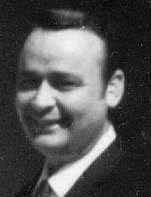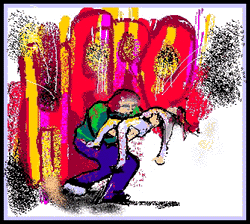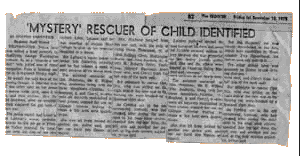 |
The older I get, the more I realize what great parents I have. They're giving people who don't stop to ask "What's in it for me?" or "Why should I help you?" before offering their support. Because of their generosity, I've been able to return to college and complete my undergraduate degree. I'd been divorced, and I'm the first to admit that I hadn't tried very hard to make them proud. Nevertheless, they supported me. When I was 30, I marched down the aisle with my fellow graduates knowing that my parents were there, looking on with tears in their eyes. My diploma hangs in their house, a tribute to their constancy and love.
One dramatic incident in which my father had, as he terms it, "the opportunity to give" happened one evening in late 1972. He was driving across Westminster (in Orange County, California) to pick up my sister from a dance. A car passed him in the lane to his left, then slowed to turn. In the rear-view mirror he noticed a flash, and pulled over automatically to see what had happened. What he saw was a sickening explosion as the car he'd passed, with its four passengers, was engulfed in flames. It had been hit from behind by a drunk driver.
Without another moment's thought, Dad ran all the way back to the scene of the accident. People were already standing around staring,as the driver, a woman, jumped from the car. A pair of men pulled two of her daughters out, just as the flames began to reach around to the engine. A third little girl, an eleven-year-old, was screaming in the back seat, saying she couldn't get her seat-belt undone. One of the men yelled that he couldn't get her door open. "It's hopeless," somebody said, as everyone moved back, and some turned away. The little girl was about to burn to death right in front of them.
 |
My father heard all this and saw all this as he strode to the car and reached through the already open door on the other side. He doesn't know how, but he pulled the child across the seat and out of the car, through the flames, and tossed her onto the street in front of her mother. He turned and walked out of the fire just as the rear window exploded. Within moments, the back seat was lost in another burst of flames. People gathered around the little girl. My dad walked back to his car in a daze and drove on, thinking only about retrieving his own daughter.
By the time he returned home, Dad was in pain. His face had begun to swell, and his arms hurt terribly. Everyone was already in bed, so without turning on the lights, he went to his room and lay down next to my mom. Dad said he was hurt, but she didn't know what he meant, and he was too tired to explain. Both of them drifted off without realizing the kind of injuries he'd suffered.
My mother stared in disbelief the next morning as she looked at my father's face and arms. All were swollen and red. He was temporarily blind and unable to see what the fire had done to him. Several days passed before he could look fully at his wife. He told her the story, how the girl and her family were safe. Since my parents are private people, they didn't feel the need to talk about what had happened to anyone outside of the family.
 |
That didn't keep the press away, of course. About a week later, a policeman showed up at our door to take a report. An article in the paper followed, identifying my dad as the "Mystery Rescuer." By that time, he was able to return to work and we all thought the incident was closed.
The wonderful thing about people, all of us, is that we do eagerly look for and recognize heroes. Perhaps we are hero-struck, but it's important to note that as much as we have become vocally critical of almost every aspect of our society, we still embrace every hero, every noble heart, every angel in disguise. I think we all voice the bad, but desire the good. We're like children crying, yet at the same time looking for help to come.
Several months after the incident, my mother had a surprise for my dad. She had been informed that Dad was to receive a Headliner Award from the Orange County Chamber of Commerce. There would be a banquet and the keynote speaker was none other than John Wayne. With tickets in hand, she and my uncle escorted Dad to what he thought was "some useless banquet they'd bought tickets for." Dad remembers only half-noticing a familiar voice. Suddenly he realized that the voice was that of John Wayne (in a recorded message, as he'd been called away that night), and that John Wayne was mentioning Dad's name!
After Mr.Wayne's account of the incident, Dad walked up to the stage to receive his plaque. He tells me now that as he reached out to shake the hand of the military officer who presented him with his award, he realized that the man was missing an arm. Dad shook the metal extensions that he had for fingers, then pointed out across the audience to some newly-returned POWs that were there that night and said, "I'm not the hero."
Dad maintains to this day that the heroes there that night were those who fought when they were asked to fight, who stood behind their country, who risked all that they had in an ongoing, terrifying battle. They weren't brave just once, but on a continuing basis, over and over again. A newspaper reporter again immortalized the moment with an article and picture.
One more tribute came two years later, when Dad was honored with the Carnegie Medal, given for extraordinary heroism by the Carnegie Hero Fund Commission, in Pittsburgh." This time he was notified by mail, and the bronze medal came without fanfare. It sits on his mantle even today, our private celebration of the kind of man my Dad proved to be one night, when the true spirit inside spoke more loudly than words, or degrees, or financial status. My Dad is the kind of man we all secretly aspire to be, the kind of person who doesn't stop for flames, or doors, or screams of terror.
When I feel down, my parents show me my diploma and tell me that I worked hard to prove myself. But again, and like anyone else, I hope that what I've really become is the kind of person who, without thinking, will do what it takes in a situation that requires bravery and selflessness. I want to be like my dad, my hero.
One last note: Cynthia Stephens, wherever you are, Dad and the rest of us think of you often. Your life is an important one, no matter what you're doing now. We all wish you and your family well.
Page created on 6/15/2004 9:35:07 AM
Last edited 1/6/2017 5:59:51 PM
